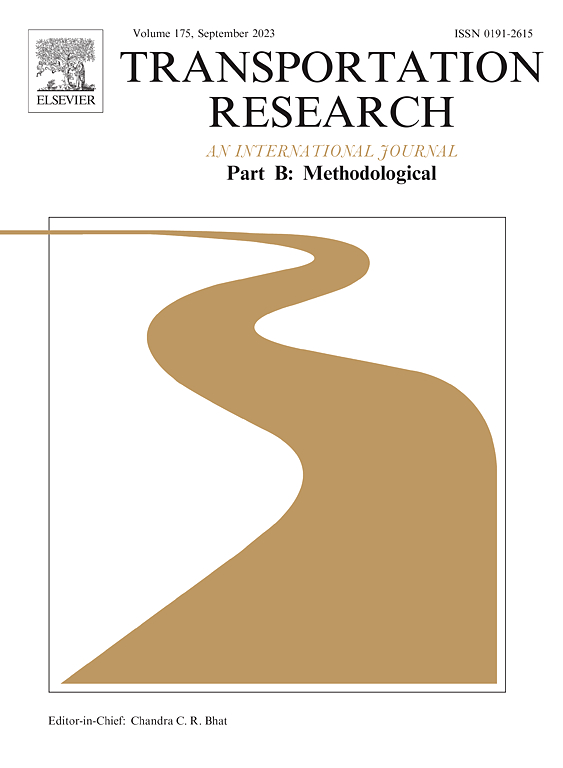重新审视交通流可观测性问题:基于矩阵的有无中心点交通网络模型
IF 5.8
1区 工程技术
Q1 ECONOMICS
引用次数: 0
摘要
本研究介绍了一种基于图论的模型,该模型通过优化无源传感器部署来解决交通网络中的链路流量可观测性问题。该模型旨在确定传感器的最小数量及其最佳位置。它构建了一个虚拟网络,并使用同构图论在原始网络和虚拟网络之间进行映射,确保节点、链路和链路方向的一致性。它提出了两个公式来计算不同网络所需的最小可观测链接数,并将链接、普通节点、中心节点和添加链接考虑在内。分析了弦、切割集和循环等关键概念及其矩阵。还开发了一个基于矩阵的框架来考虑流量守恒条件。结果表明,使用节点流量守恒方程求解全链路流量可观测性问题,可以得到具有非唯一部署方案的固定数量传感器。此外,还提出了一种资源受限的传感器网络优化(RSNO)模型,采用空空间投影(NSP)作为目标函数,量化预算约束的影响,尤其是在无法观测到所有链路流量的情况下。数值示例展示了 RSNO 模型的应用。本文章由计算机程序翻译,如有差异,请以英文原文为准。
Revisiting the traffic flow observability problem: A matrix-based model for traffic networks with or without centroid nodes
This study introduces a graph theory-based model that addresses the link flow observability problem in traffic networks by optimizing passive sensor deployment. The model aims to determine the minimal number of sensors and their optimal placement. It constructs a virtual network and uses isomorphic graph theory to map between the original and virtual networks, ensuring consistency in nodes, links, and link directions. Two formulas are proposed to calculate the minimum number of observable links required across different networks, factoring in links, ordinary nodes, centroid nodes, and added links. Key concepts such as chords, cut sets, and loops, along with their matrices, are analyzed. A matrix-based framework is developed to consider flow conservation conditions. Results show that solving the full link flow observability problem using node flow conservation equations yields a fixed number of sensors with non-unique deployment schemes, Additionally, a resource-constrained sensor network optimization (RSNO) model is presented, employing null space projection (NSP) as an objective function to quantify the impact of budget constraints particularly under the condition if all the link flows cannot be observed. Numerical examples demonstrate the RSNO model's applications.
求助全文
通过发布文献求助,成功后即可免费获取论文全文。
去求助
来源期刊
CiteScore
12.40
自引率
8.80%
发文量
143
审稿时长
14.1 weeks
期刊介绍:
Transportation Research: Part B publishes papers on all methodological aspects of the subject, particularly those that require mathematical analysis. The general theme of the journal is the development and solution of problems that are adequately motivated to deal with important aspects of the design and/or analysis of transportation systems. Areas covered include: traffic flow; design and analysis of transportation networks; control and scheduling; optimization; queuing theory; logistics; supply chains; development and application of statistical, econometric and mathematical models to address transportation problems; cost models; pricing and/or investment; traveler or shipper behavior; cost-benefit methodologies.

 求助内容:
求助内容: 应助结果提醒方式:
应助结果提醒方式:


